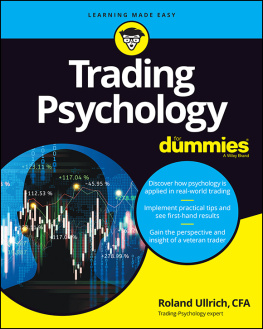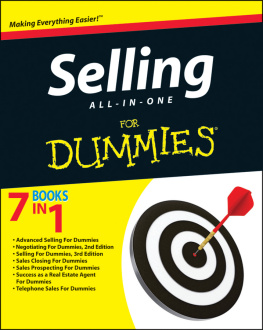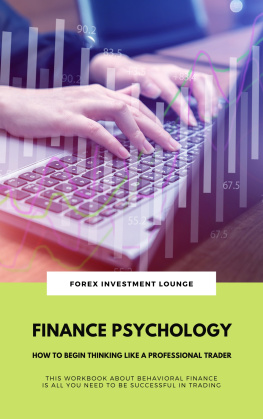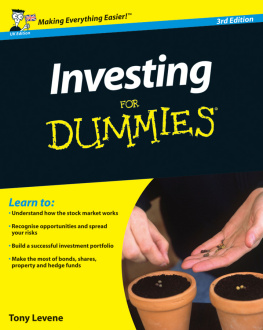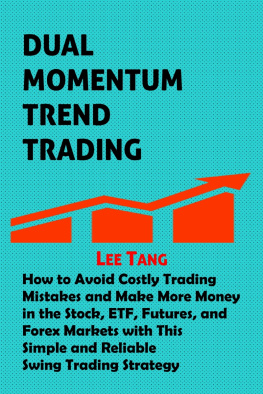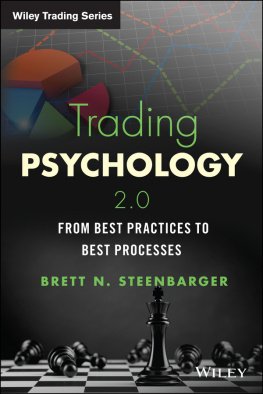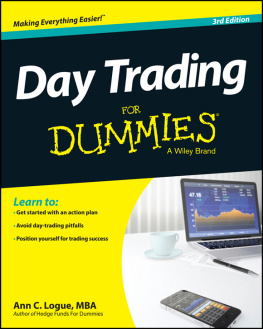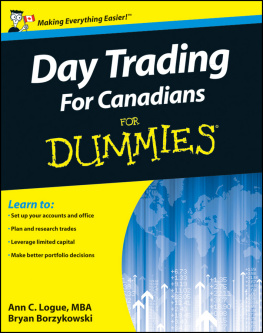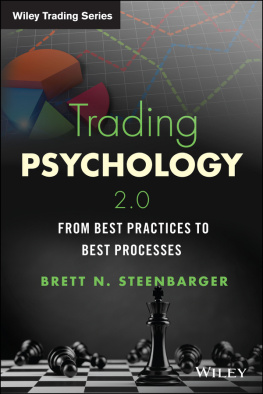
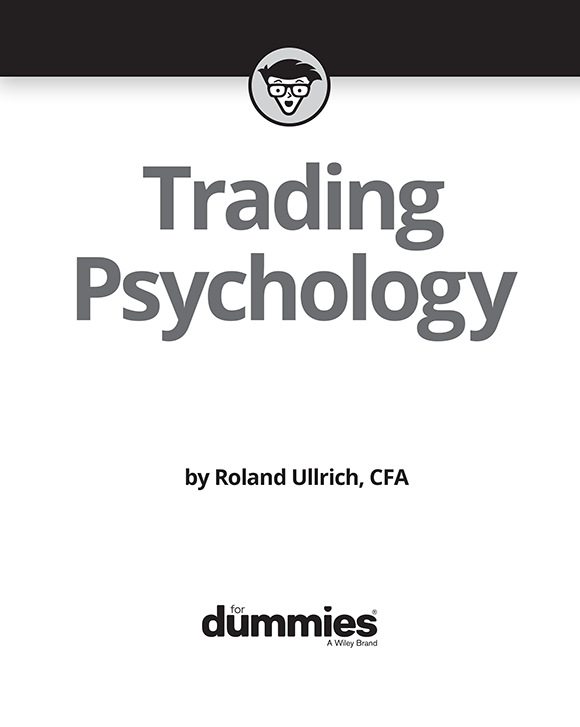
Trading Psychology For Dummies
Published by: John Wiley & Sons, Inc., 111 River Street, Hoboken, NJ 07030-5774, www.wiley.com
Copyright 2022 by John Wiley & Sons, Inc., Hoboken, New Jersey
Published simultaneously in Canada
The German original published 2021 under the Title Trading Psychologie fuer Dummies
Copyright 2021 by Wiley-VCH GmbH, Germany.
All rights reserved
This translation published under license with the original publisher Wiley-VCH GmbH. Germany.
No part of this publication may be reproduced, stored in a retrieval system or transmitted in any form or by any means, electronic, mechanical, photocopying, recording, scanning or otherwise, except as permitted under Sections 107 or 108 of the 1976 United States Copyright Act, without the prior written permission of the Publisher. Requests to the Publisher for permission should be addressed to the Permissions Department, John Wiley & Sons, Inc., 111 River Street, Hoboken, NJ 07030, (201) 748-6011, fax (201) 748-6008, or online at http://www.wiley.com/go/permissions .
Trademarks: Wiley, For Dummies, the Dummies Man logo, Dummies.com, Making Everything Easier, and related trade dress are trademarks or registered trademarks of John Wiley & Sons, Inc. and may not be used without written permission. All other trademarks are the property of their respective owners. John Wiley & Sons, Inc. is not associated with any product or vendor mentioned in this book.
LIMIT OF LIABILITY/DISCLAIMER OF WARRANTY: WHILE THE PUBLISHER AND AUTHORS HAVE USED THEIR BEST EFFORTS IN PREPARING THIS WORK, THEY MAKE NO REPRESENTATIONS OR WARRANTIES WITH RESPECT TO THE ACCURACY OR COMPLETENESS OF THE CONTENTS OF THIS WORK AND SPECIFICALLY DISCLAIM ALL WARRANTIES, INCLUDING WITHOUT LIMITATION ANY IMPLIED WARRANTIES OF MERCHANTABILITY OR FITNESS FOR A PARTICULAR PURPOSE. NO WARRANTY MAY BE CREATED OR EXTENDED BY SALES REPRESENTATIVES, WRITTEN SALES MATERIALS OR PROMOTIONAL STATEMENTS FOR THIS WORK. THE FACT THAT AN ORGANIZATION, WEBSITE, OR PRODUCT IS REFERRED TO IN THIS WORK AS A CITATION AND/OR POTENTIAL SOURCE OF FURTHER INFORMATION DOES NOT MEAN THAT THE PUBLISHER AND AUTHORS ENDORSE THE INFORMATION OR SERVICES THE ORGANIZATION, WEBSITE, OR PRODUCT MAY PROVIDE OR RECOMMENDATIONS IT MAY MAKE. THIS WORK IS SOLD WITH THE UNDERSTANDING THAT THE PUBLISHER IS NOT ENGAGED IN RENDERING PROFESSIONAL SERVICES. THE ADVICE AND STRATEGIES CONTAINED HEREIN MAY NOT BE SUITABLE FOR YOUR SITUATION. YOU SHOULD CONSULT WITH A SPECIALIST WHERE APPROPRIATE. FURTHER, READERS SHOULD BE AWARE THAT WEBSITES LISTED IN THIS WORK MAY HAVE CHANGED OR DISAPPEARED BETWEEN WHEN THIS WORK WAS WRITTEN AND WHEN IT IS READ. NEITHER THE PUBLISHER NOR AUTHORS SHALL BE LIABLE FOR ANY LOSS OF PROFIT OR ANY OTHER COMMERCIAL DAMAGES, INCLUDING BUT NOT LIMITED TO SPECIAL, INCIDENTAL, CONSEQUENTIAL, OR OTHER DAMAGES.
For general information on our other products and services, please contact our Customer Care Department within the U.S. at 877-762-2974, outside the U.S. at 317-572-3993, or fax 317-572-4002. For technical support, please visit https://hub.wiley.com/community/support/dummies .
Wiley publishes in a variety of print and electronic formats and by print-on-demand. Some material included with standard print versions of this book may not be included in e-books or in print-on-demand. If this book refers to media such as a CD or DVD that is not included in the version you purchased, you may download this material at http://booksupport.wiley.com . For more information about Wiley products, visit www.wiley.com .
Library of Congress Control Number: 2022941293
ISBN 978-1-119-87958-9; ISBN 978-1-119-87959-6 (ePDF); ISBN 978-1-119-87960-2 (epub)
Trading Psychology For Dummies
To view this book's Cheat Sheet, simply go to www.dummies.com and search for Trading Psychology For Dummies Cheat Sheet in the Search box.
Table of Contents
List of Tables
- Chapter 4
List of Illustrations
- Chapter 3
- Chapter 4
- Chapter 5
- Chapter 11
Guide
Pages
Introduction
Trading psychology the psychological basis of securities trading generally isnt taken very seriously, even though experts maintain that your emotions and your mental state are actually what determine the success or failure of your trading business. Those in the know are clear on this point: Trading is 80 percent psychology and 20 percent methodology. Trading is fundamentally a matter of character.
Trading the common term for the short-term trade in securities, currencies, and financial derivatives has become increasingly popular recently. Discount brokers especially have been seeing record numbers since 2020. They promise they'll make stock market trading as easy as pie with the help of their various trading apps. This has a certain attraction for a younger, less experienced generation and encourages gambling. But a word to the wise: If you're looking for an adrenaline rush and you think that leveraged products will make you rich overnight, you're sure to hit the rocks sooner or later. Trading in financial instruments is a sophisticated business and requires not only lots of patience and discipline but a clear head as well. You dont stand a chance without a plan, a strategy, and processes you can rely on.
Regarding terminology, I'd like to make one thing clear from the start: When I say traders in this book, I'm referring to those private investors who independently invest their own money on the stock market at their own risk and on a short-term basis. The time period can be as short as a few minutes (scalping) or as long as a few weeks (position trading).
Fundamentally, trading in this sense is the opposite of a long-term investment. You're looking for calculated short-term profit. If you make regular contributions to a stock portfolio in order to prepare for retirement, you're a long-term investor, not a trader. Admittedly, you could turn a trading position into a long-term investment now and then, perhaps because you dont want to sustain a loss, so you use a bit of mental jujitsu on yourself and voil your short-term investment is now presented as something you'd always intended as a long -term investment. (I talk more about this bias known as mental accounting later on in this book. I know: The suspense is killing you.)
The stock market is all about psychology, and trading places psychology under a magnifying glass. Limiting beliefs, self-doubt, a lack of self-control, unprocessed traumatic experiences from the past, those negative conversations you hold with yourself (self-talk, to use the current jargon), and harmful patterns of thought will all come to light sooner or later as you go about your work as a trader. As such, trading turns out to be quite an expensive way to work through your personality issues. After all, you're risking your own money on the markets conceivably, money in the form of savings you worked very hard to accrue. And the numbers are against you because (according to statistics) over 90 percent of all private traders on the stock exchange dont earn any money. The vast majority close their trading account within a few months, feeling frustrated often, after suffering a total loss. The success rate is particularly low for those operating in the short-term arena.
Next page
